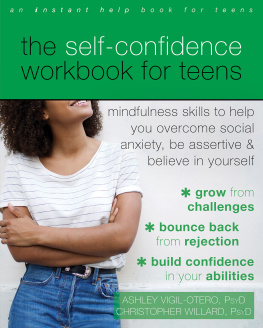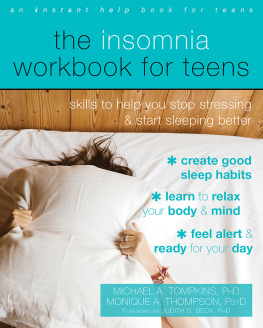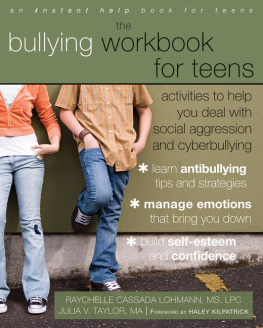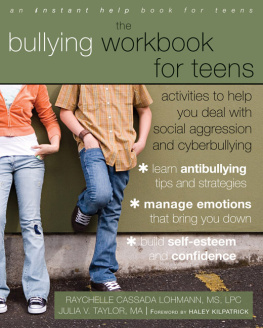The Masculinity Workbook for Teens is the book adolescent boys and those of us who work with them have desperately wanted. Not because it has all the answers, but because it doesnt. It doesnt replace the guy code with a set of more progressive rules. With respect and guidance, it empowers boys to explore and create their own guidelines for being a man. A magnificent achievement.
Stephen Tosh , CEO of the Boys Club of New York, career youth worker, father of a son, and survivor of his own adolescence
The Masculinity Workbook for Teens is an excellent resource for parents, caregivers, mentors, coaches, and educators to share with the boys in their lives. This practical guide empowers boys to navigate the guy code, a set of unspoken rules they are pressured to follow to prove they are man enough. Reigeluth has created an incredibly useful workbook for boys to do the inner work to uncover their whole humanity and authentic selves.
Jennifer Siebel Newsom , filmmaker, and founder of The Representation Project
Young men long for us to acknowledge the realities of their lives; not to blame or shame them, nor condescend or lecture. What Christopher Reigeluth accomplishes so thoughtfully is to make this urgent conversation broadly accessible. By inviting boys to reflect on the air they breathe, he offers an invaluable guide to awakened masculinity. I heartily recommend this workbook to all who care about boys.
Michael C. Reichert, PhD , author of How to Raise a Boy , and director of the Center for the Study of Boys and Girls Lives at the University of Pennsylvania
How do you talk to a boy about masculinity? About what it means to be a man? You can give your son this book, or you can use the personal stories, quotes, and exercises provided by Christopher Reigeluth to shape the conversations youll have with your son over the next few years.
Andrew P. Smiler, PhD , therapist, and author of the award-winning Dating and Sex
Teenage males probably would not ask for this book, but secretly I bet they all want this: an actual guide for being a man that goes beyond standard scripts and norms for how men are supposed to be. What makes this book wonderful is that it is more of a DIY guide to being the healthy and complete man that you are and want to be. All the young men in my life are getting copies.
Matt Englar-Carlson, PhD , professor of counseling at California State University, Fullerton; and director of the Center for Boys and Men
The Masculinity Workbook for Teens is as important as it is timely. Timely because it identifies an underlying pathway to addressing the pain and confusion boys and men are feeling and perpetuating across America. Important because the workbook empowers and equips each reader to become part of the solution through the development and modeling of healthy masculinities.
Joe Ehrmann , author, activist, and president of the InSideOut Initiativea national movement to reclaim the social-emotional and character development sports can and should provide for every participant
This is the book that all people who care about boys have wanted for a very long time. It speaks to boys and not at them, and engages their natural intelligence and curiosity, including their ability to think critically and emotionally about their own experiences. The going deeper sections are brilliantly constructed to get at what boys really think and feel, and not simply what they think they should believe. The author even takes an intersectional approach in his discussion of identities, making it both a critically important book and a timely one. Buy it and give it to any boy or young man you know! You will change their lives.
Niobe Way, EdD , author of Deep Secrets the inspiration for the Grand Prix-winning movie, Close , at the Cannes Film festival
Boys need opportunities to explore who they want to be, not a society that imposes stereotypes dictating who boys should become. In this novel workbook for boys themselves, psychologist Chris Reigeluth offers a collection of distinct activities to help boys examine how the guy code impairs their ability to choose who they want to become. School professionals and other concerned adults will find this workbook indispensable toward supporting boys self-discovery.
Joseph Derrick Nelson, PhD , associate professor of educational studies at Swarthmore College, and senior research fellow with the Center for the Study of Boys and Girls Lives at the University of Pennsylvania
Publishers Note
This publication is designed to provide accurate and authoritative information in regard to the subject matter covered. It is sold with the understanding that the publisher is not engaged in rendering psychological, financial, legal, or other professional services. If expert assistance or counseling is needed, the services of a competent professional should be sought.
INSTANT HELP, the Clock Logo, and NEW HARBINGER are trademarks of New Harbinger Publications, Inc.
New Harbinger Publications is an employee-owned company.
Copyright 2022 by Christopher S. Reigeluth
Instant Help Books
An imprint of New Harbinger Publications, Inc.
5674 Shattuck Avenue
Oakland, CA 94609
All Rights Reserved
Cover design by Amy Shoup
Acquired by Georgia Kolias
Edited by James Lainsbury
Library of Congress Cataloging-in-Publication Data
Names: Reigeluth, Christopher S., author.
Title: The masculinity workbook for teens : discover what being a guy means to you / Christopher S. Reigeluth, PhD.
Description: Oakland, CA : Instant Help Books, [2022] | Includes bibliographical references. | Audience: Ages 13-19
Identifiers: LCCN 2022027973 | ISBN 9781684039494 (trade paperback)
Subjects: LCSH: Teenage boys--Psychology--Juvenile literature. | Masculinity--Juvenile literature. | BISAC: YOUNG ADULT NONFICTION / Boys & Men | YOUNG ADULT NONFICTION / Health & Daily Living / Maturing
Classification: LCC HQ797 .R46 2022 | DDC 155.5/32--dc23/eng/20220629
LC record available at https://lccn.loc.gov/2022027973
To Finn (who will be a teen soon enough) and adolescent guys everywhere
Cracking the Guy Code to Be Your Authentic Self
Contents
Foreword
When I was interviewing boys for Raising Cain , the book about the psychology of boys that Dan Kindlon and I wrote in 1999, I spoke at length with a ninth-grader about how boys manage those most human feelings of shame, sadness, and vulnerability. He acknowledged that most boys try to hide such feelings from others so that they wont look weak. We both knew that the desire to look strong is one of the requirements of masculinity that boys start to absorb by age three or four: Boys are tough. Boys dont cry. When I asked him what might happen if a boy kept his feelings to himself over a period of years, always trying to look more masculine, he observed, Well, if you dont ever talk about them, you might not know what your feelings are.
Everyone who raises a boy, educates boys, or writes about boys worries about their emotional lives because we all see boys who cannot seem to recognize what they are truly feeling out of a desire to appear in charge, masculine, and tough. In the Academy Awardwinning movie Ordinary People , a grief-stricken high school boy who has lost his brother in a boating accident goes to see a psychiatrist who asks him what hed like to get out of therapy. The boy, who hasnt taken off his coat or his backpack and looks ready to bolt at any second, answers, I want to be more in control. The psychiatrist, played brilliantly by the actor Judd Hirsch, recommends therapy twice a week. Immediately, the boy objects. The doctor explains, Well, control is a tough nut. We recognize that he is slyly referring both to the impossibility of achieving perfect control in this life, but also describing the boy himself, who is going to be a very tough nut to crack. The boy is ready to endure months of strangulated pain and sadness rather than experience the helplessness and guiltthe weaknessof having been unable to save his brothers life.













